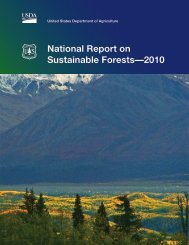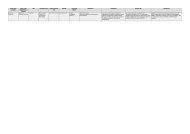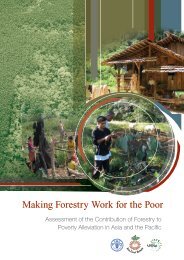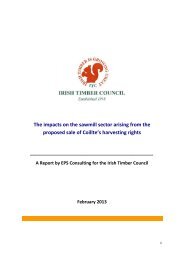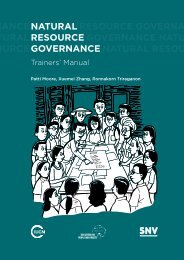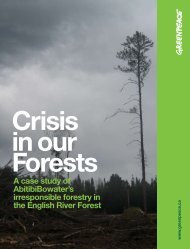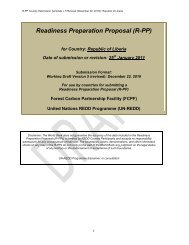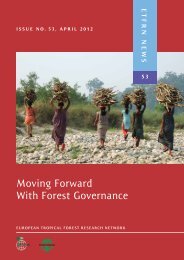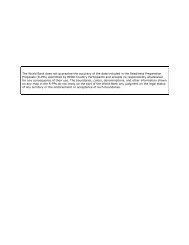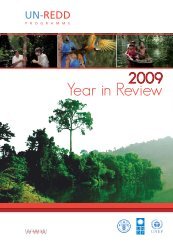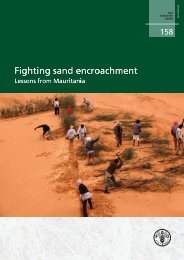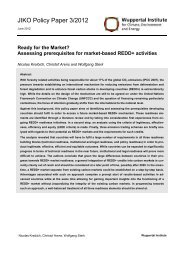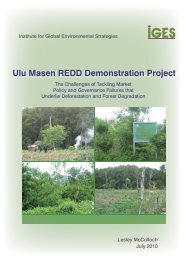Africa - part of its corporate citizenship activities
Africa - part of its corporate citizenship activities
Africa - part of its corporate citizenship activities
Create successful ePaper yourself
Turn your PDF publications into a flip-book with our unique Google optimized e-Paper software.
Name <strong>of</strong> thecandidateDave LoubserName <strong>of</strong> theOrganization orNetworkThe <strong>Africa</strong>nWildlife FoundationTitle Address/Country Telephone/Fax/e-mail Website Language(s)SpokenDirector Ngong Road,<strong>of</strong> KarenClimateP.O. Box 310,Change00502NAIROBI, KENYATel: +254 20 2765000Fax: +254 20 2765030dloubser@awfke.orgwww.awf.org English The <strong>Africa</strong>n Wildlife Foundation (AWF) is aninternational non-governmental organizationcommitted to conserving <strong>Africa</strong>’s naturalresources while leveraging the continent’stremendous natural endowment for economicgrowth and improved livelihoods for <strong>its</strong> people.AWF was founded in 1961 to improve thecapacity <strong>of</strong> <strong>Africa</strong>n institutions and individualsto manage wildlife and other natural resources.AWF’s program has evolved and today isbased on an integrated landscape-scaleapproach that conserves critical habitat,enables sustainable natural resourcemanagement, and improves livelihoods. AWF’smission is to work with the people <strong>of</strong> <strong>Africa</strong> toensure the wildlife and wild lands <strong>of</strong> <strong>Africa</strong>endure forever. AWF’s core value is ‘<strong>Africa</strong>nledconservation’ and over 85% <strong>of</strong> AWF’s staff,including <strong>its</strong> leadership, are <strong>Africa</strong>n nationals.AWF is Headquartered in Kenya and is activelyworking with communities, local governments,scientists and civil society organisations in 9large landscapes in 14 countries <strong>of</strong> subSaharan <strong>Africa</strong> (Kenya, Tanzania, Uganda,Rwanda, Democratic Republic <strong>of</strong> Congo, ,Mozambique, Zambia, Zimbabwe, Namibia,Botswana, South <strong>Africa</strong>, Burkina Faso, Niger,and Benin).Question #1 Question #2 Question #3 Question #4In each <strong>of</strong> <strong>its</strong> heartland programs, AWFworks closely with communities, local civilsociety organizations, individuals, and localgovernments to plan for and implementconservation actions including REDD+<strong>activities</strong>. AWF uses a range <strong>of</strong> approachesto gathering insights and perspectives fromthese individuals and groups includingworking group meetings, targeted interviews,stakeholder roundtables, communitymeetings, and informal conversations. Wedraw on these insights and perspectives toinform our policy advisory work approachesat national, regional and global levels. Wherepossible we bring local stakeholders directlyinto touch with policy makers throughspecially designed forums. As an example,AWF convened a diverse group <strong>of</strong>representatives (women’s groups, forestscouts, District <strong>of</strong>ficers, and local farmers)from a REDD+ project in Northern Tanzaniato discuss their achievements, challengesand insights with Norwegianparliamentarians. As a pan-<strong>Africa</strong>nconservation NGO working on severalREDD+ pilot programmes across easternand Central <strong>Africa</strong>, we also aim to ensure ourproject proponents benefit from region-wideperspectives on REDD+ challenges and bestpractice through the wide dissemination <strong>of</strong>information through our community networks.AWF collaborates closely with a number <strong>of</strong>multilateral agencies ranging from theCIFOR group to FAO. This collaborationinvolves field-based work in areas <strong>of</strong> naturalresources management including REDD+implementation. AWF is also a longstandingmember <strong>of</strong> IUCN and members <strong>of</strong> AWF’sstaff are members <strong>of</strong> many <strong>of</strong> IUCN’sCommissions and make contributions to theIUCN program at the highest levels. AWFhas engaged in REDD+ policy discussionswith a focus on bringing field-basedexperience (in DRC, Tanzania and Kenya)to national and global dialogues. Thisincludes <strong>part</strong>icipating in the TanzanianREDD policy forum and engaging directly inthe UNFCCC process.AWF does not have any financial,technical or advisory arrangements withthe UNREDD programme directly, butcontributes to the UNREDD Programme inTanzania through our <strong>part</strong>icipation in theNational REDD Task Force as well asthrough the Norwegian Embassy. AWF’sREDD work is financed through theNorwegian government, USAID and theDutch government and links with thesedonors regularly on a technical andadvisory basis including, for instance,<strong>part</strong>icipating in structured dialoguesaround social and environmentalsafeguards for REDD+, benefit sharingmodels, satellite –based classification <strong>of</strong>deforestation and degradation, GIS tools,and community-based Measurement,Reporting and Verification approaches.Ge<strong>of</strong>rey MwanjelaTanzania NaturalResource ForumHead Tanzania +255 684 009575 http://www.tnrf.org/ English<strong>of</strong>andProgrammesSwahiliTanzania Natural Resource Forum based andoperating in Tanzania, is a membership-basednon governmental organization registered in2006. TNRF membership is made up <strong>of</strong>representatives from civil society organizations,academia, private sector and individuals withan interest in improving natural resourcesgovernance in Tanzania. Within this broadcontext, TNRF focuses attention on thegovernance <strong>of</strong> wildlife, forestry and rangelands.To strengthen active membership engagementand action, TNRF facilitates member-drivenWorking Groups on policy and practice issuesthat are <strong>of</strong> direct use and interest to members.TNRF also provides support to projects andinitiatives that respond to member’s interests.TNRF strengthens dialogue in variousinitiatives: task forces, meetings, debates,media, newsletters, film and electronicinteractive communications. All <strong>of</strong> theseinitiatives provide opportunities for TNRF’sdiverse membership to collaborate and tackleissues <strong>of</strong> policy and governance in a practicalway and at different levels. TNRF’s mission isto work for improved natural resourcegovernance by being a demand-driven network<strong>of</strong> members and <strong>part</strong>ners that helps people tobridge the gap between people’s local naturalresource management needs and practices,and national natural resource managementpriorities, policies, laws and programs.Over the past 6 years, TNRF has beengathering, facilitating and representing views<strong>of</strong> various groups within the society throughplatforms. The platforms have been onnatural resources focal areas - land, forests,wildlife and rangelands. The focus ongender, rights on use <strong>of</strong> resources, capacitybuilding, and economic empowerment hasalways been the center <strong>of</strong> discussions in theplatforms. These areas <strong>of</strong> engagement havealso prompted TNRF to strengthen andstrategise how the organizationcommunicate and disseminate information tomembers and <strong>part</strong>ners. At the moment,TNRF has a strong communicationde<strong>part</strong>ments reaching not only the memberswithin Tanzania but also in countries outsideTanzania through various informationpackages.In terms <strong>of</strong> Forestry and REDD – TNRFhosts the Tanzania Forestry Working Group(TFWG) and the global initiative (ForestGovernance Group). The two groups havebeen active in steering forestry policyreviews over the past few years. The TFWGinitiated a recently launched 5-years MamaMisitu Campaign program (US$ 5 Million)finance by two governments that will becoordinated by TNRF and implemented by10 <strong>part</strong>ners at national and local level. Thecampaign overall aim is to improve forestgovernance in Tanzania throughcommunication strategies. TNRF alsocoordinates REDD Lessons learningnetworks/Knowledge sharing among CSOsworking on REDD+. Through this network,TNRF has actively led and engaged with alearning network for CSOs working onREDD+, which includes coordination <strong>of</strong> thecarbon community network and regularmeetings for REDD pilots; TNRF has alsobeen disseminating information throughpublications, films, radio and TV to manystakeholders on REDD+ issues; TNRF andother <strong>part</strong>ners have worked with Ministry <strong>of</strong>Environmental Affairs in Mozambique andengaged fully with other <strong>Africa</strong>ngovernments at two COPs on REDD+issues.TNRF does not have any financial,technical and/ or advisory arrangementwith the UN-REDD but over time TNRFhas been requested by the country's UN-REDD programme to coordinate REDDstakeholders meetings. TNRF as anational platform for organizations dealingwith natural resources has been the focalpoint for REDD pilots projects within thecountry - coordinating regular meetings;facilitating joint statements to thegovernment and international community;designing, conducting and disseminatingstudies on REDD (e.g. REDD an gender);providing space for national organizationsin annual conference <strong>of</strong> <strong>part</strong>ies (COP). Ofinterest to this arrangement with REDDpilots, TNRF was asked by the NationalREDD Task Force (NRTF) to coordinatethe election <strong>of</strong> representative from the civilsociety organization to the task force.




